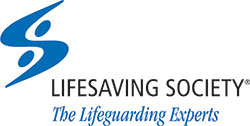Become a Lifeguard and/or Instructor
You can become an Instructor or Lifeguard by completing the following Canadian Lifesaving Society's Instructor and Lifeguarding Programs.
Spring/Summer 2026 offerings:
Canadian Lifesaving Society Program

Lifeguard |
||
|---|---|---|
| Bronze Family (Bronze Star, Bronze Medallion and Bronze Cross) |
Bronze classes prepare participants who are wishing to become Lifeguards for the National Lifeguard Award (NLA) | |
| Bronze Star Prerequisites: Star Patrol |
The pre-Bronze Medallion training standard | |
| Bronze Medallion Prerequisite: 13 years of age or Bronze Star |
Teaches an understanding of the lifesaving principles embodied in the four components of water rescue education | |
| Bronze Cross Prerequisite: Bronze Medallion |
||
| National Lifeguard Award (NLA) | Prerequisite: 15 years of age and Bronze Cross and CPR-C/Standard First-Aid | Prepares participants who are wishing to become Lifeguards for the National Lifeguard Service (NLS). |
Instructor |
||
| Lifesaving Instructor/Advanced Instructor/Exam Standards (LSI) |
Prerequisites: 15 years of age and Bronze Cross or NLA | |
Class Descriptions
The Canadian Swim Patrol Program involves Rookie, Ranger and Star. This program provides enriched training for children who are ready to go beyond learn-to-swim and leads into the Bronze Family Program.
The Bronze Family Program consists of Bronze Star, Bronze Medallion and Bronze Cross. This program is designed for swimmers who are looking to further enhance their lifesaving knowledge and skills for a variety of situations. Bronze classes prepare participants who are wishing to become Lifeguards for the National Lifeguard Award (NLA).
Those wishing to take Bronze Medallion must be 13 years of age or have Bronze Star. Those wishing to take Bronze Cross must have Bronze Medallion.
People who are looking to lifeguard at swimming pools, water parks and lakefronts must have their NLA certification. This program focuses on the legal obligations of lifeguards, team work, advanced emergency care in aquatic emergencies and spinal immobilization.
Candidates wishing to take NLA must be 15 years of age, have previously taken Bronze Cross and have a CPR-C/Standard First-Aid certification.
The Lifesaving Instructor Program is an instructor training program that enables successful candidates to instruct the Swim Program and Canadian Swim Patrol Program. Also, by taking the LSI course through USask Rec you will also be able to instruct the Bronze Family Program. This course also includes examiner standards which enables the candidate to eventually examine their own classes after apprenticing other exams.
Candidates taking Lifesaving Instructor must have a Bronze Cross or NLA and be 15 years of age.
CPR/AED/First-Aid Courses
This 10 hour program provides certification in CPR-C/Standard First-Aid. Information covers the following: The EMS system, Check, Call, Care, Airway Emergencies, Breathing & Circulation Emergencies, First-Aid for Respiratory and Cardiac Emergencies, Head & Spine Injuries, Wound Care, Sudden Medical Emergencies, Environmental Emergencies.
An additional online course must be completed prior to attending the 10 hour in-person training.
The full First-Aid and CPR instructor course is a 40 hour program including demonstration of skills. Upon completion of the core component of the course there is a practice teaching component to be completed and then the candidate is able to teach the Pupil Level CPR/AED/First-Aid award. Candidate must be 18 years of age and have a proof of a current Standard First-Aid and CPR-C.
The second format to reach certification is a First-Aid Instructor Transfer Course and is 16 hours in length including demonstration of skills PLUS completion of a study guide. Upon completion of the core component of the course there is a practice teaching component to be completed and then the candidate is able to teach the Pupil Level CPR/First-Aid award. Candidate must be 18 years of age, and have a current CPR-C certification, and ONE of the following: Proof of current First- Aid instructor with another organization, CPR instructor with another organization, Red Cross WSI certification, Red Cross First-Aid instructor whose certification has been expired for two years or more, but less than seven years, or a teacher with an education degree and teaching experience. Upon completion of the core component of the course there is a practice teaching component to be completed and then the candidate is able to teach the Pupil Level CPR/First-Aid award.
Renewal Options
Have your previous Lifeguard and/or Instructor awards expired? There are easy renewal options available to get back on deck.
Canadian Red Cross CPR/Standard First Aid – Must be recertified every 3 years. Once the original recertified award has expired, you must
Canadian Lifesaving Society – National Lifeguard Award – Must be recertified every 2 years in order to use as a lifeguarding award.
The Lifesaving Society at 306-780-9255
The Red Cross at 1-877-356-3226
Questions?
Contact us if you need more information.
General Office
Room 222, Physical Activity Complex (PAC)
College of Kinesiology, USask
87 Campus Drive
Office Hours: 8:30 am - 12:00 pm and 1:00 pm - 4:30 pm, Monday - Friday

